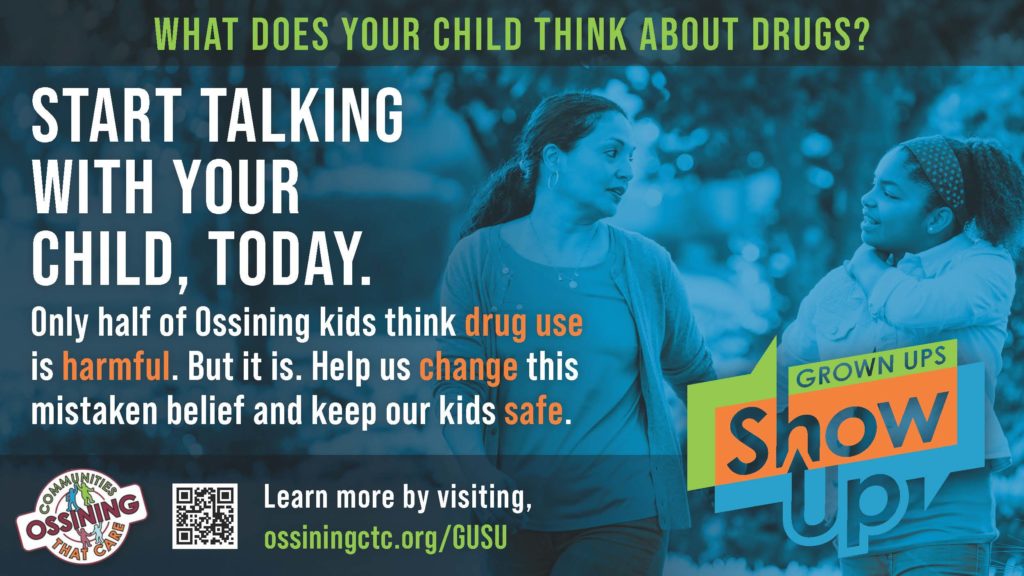Open Door was awarded three Digital Health Awards by the Health Information Resource Center (HIRC) for its “Grown Ups Show Up!” (GUSU) campaign, which launched in December 2021. The awards recognized excellence in the development of digital public health messaging directed to support adults to start conversations with teens about avoiding drugs and alcohol. Open Door was awarded for the campaign’s tip sheets, digital images for social media, and the GUSU webpage. Grown Ups Show Up | Ossining Communities That Care (ossiningctc.org)
Through the campaign, Ossining’s Communities that Care Coalition (OCTC), cofounder of GUSU, urges adults to Show Up and be good sources of information to teens and young people about the risks of underage alcohol and drug use.
Initiating a conversation or answering tough questions on this topic may be difficult for parents and other role models but is key when communicating with young people.
“We found that two out of every five middle and high school students in Ossining report never having conversations with their parents about alcohol and drugs,” said Alice Joselow, OCTC coordinator. “Grown Ups Show Up!” is in direct response to that and gives parents and other adults the tools, tips, and support they need to provide accurate, helpful information on ways to begin this important two-way dialogue with young people.”
The campaign is based on scientific evidence that kids do listen to their parents when it comes to alcohol and drugs, and that parents have a huge influence on their children’s decisions – even if it may not always seem like it. This is particularly important as nine out of 10 adults with substance abuse problems started using before age 18, according to the National Center of Addiction and Substance Abuse.
“Some parents don’t know where to start,” said Helene Kopal, Director, Substance Use Disorder Services at Open Door Family Medical Center. “We’ve tried to address that here with tips on how to open the conversation naturally and avoid having ‘the big talk,’ which teens can resist. Some parents get nervous talking about drugs and alcohol or feel like they are being nags. But the data show that simple, repeated conversations are effective, and the kids are listening.”
GUSU offers suggestions on how and when to start the conversation, handle pointed questions from kids, and navigate the influences – both positive and negative – of their friends. Noticeable shifts in behavior– moodiness, irritability, nervousness or even giddiness may stem from alcohol or drug use while physical signs include loss or increase in appetite, inability to sleep or unusual laziness; nausea, vomiting, sweating, shaking of hands, feet or head; and/or red, watery eyes with pupils larger or smaller than usual. Parents should be alert to these but should not wait to talk to kids: the goal is to open communication before they use.
Adults, according to experts, need to begin by educating themselves on the risks of alcohol, vapes and drugs; set clear no use rules; avoid giving alcohol to young people; be familiar with their children’s friends and their parents; and if adults do drink, they drink responsibly.
“This campaign really helps parents, teachers and staff, as well as coaches and other adults in Ossining, get on the same page when discussing drugs and alcohol. The schools are totally on board with it,” said Ray Sanchez, Superintendent, Ossining Union Free School District. Other Ossining coalition stakeholders supporting the effort include Ossining’s newly-formed Youth Bureau, Public Library, Recreational Center, and Police Department, as well as Ossining Parents Advocating Collectively for our Children (OPACC), the PTA, Padres Hispanos, and Home Run Against Drugs.
Grown Ups Show Up! – or Los Adultos Se Presentan in Spanish – was co-developed by the coalition’s partner organizations. Materials and messages, said Joselow, went through rigorous review to ensure they are culturally and linguistically meaningful to Ossining families. Digital media designs and material development were spearheaded by KDH Research & Communication, a public health research and communication company specializing in community-based prevention messaging. It is one of several initiatives funded through the five-year grant, Strategic Prevention Framework Partnerships For Success, from the Substance Abuse and Mental Health Services Administration, which was secured by Open Door on behalf of the coalition.
OCTC is a grassroots, community-based coalition that supports positive youth development and substance use prevention. The organization collaborates with diverse community partners and experts to maximize opportunities for substance use prevention and social, academic, and personal growth through innovative youth-oriented programs in Ossining.




